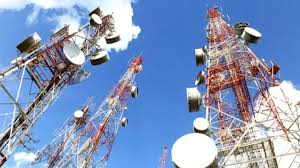A cursory look at various sectors of the economy portrays the telecommunications sector as among the sectors that contribute more to the country’s GDP, but a recent report made available by Financial Derivatives Limited revealed that the sector’s growth was receding; writes.
In 2001 when the administration of President Olusegun Obasanjo granted license to companies to begin the Global System for Mobile Communications (GSM), it opened a new chapter in the way business was conducted and the entire business landscape was revolutionised.
The country’s telecommunication industry witnessed a surge, especially with a rapidly growing mobile phone user-base and increasing internet penetration.
The Nigerian telecom market is a sector brimming with potential as mobile phone explosion; rising data demand, broadband expansion, and digital transformation are all driving the growth.
According to industry expert, Sippi Thomas, the government and private companies are investing heavily in expanding broadband infrastructure across Nigeria.
“This includes laying down fiber optic cables and building new cell towers, making internet access faster and more reliable.
“Businesses and individuals in Nigeria are increasingly embracing digital solutions. This creates a demand for reliable and high-speed internet connectivity, further boosting the market.”
This is as analysts point to the first quarter GDP report by the National Bureau of Statistics (NBC) as a pointer to the strength of the sector.
NBS Q1 report
In its Nigeria Gross Domestic Product (GDP) Report for the first quarter of 2024, the NBS stated that the non-oil sector grew by 2.80% in real terms during the reference quarter. This rate was higher by 0.02% points lower than the fourth quarter of 2023.
According to the report, the growth was driven mainly by Financial and Insurance (Financial Institutions); Information and Communication (Telecommunications); Agriculture (Crop production); Trade and Manufacturing (Food, Beverage, and Tobacco), accounting for positive GDP growth.
The statistics’ bureau explained that in real terms, the non-oil sector contributed 93.62% to the nation’s GDP in the first quarter of 2024, lower than the share of recorded in the first quarter of 2023 which was 93.79% and lower than the fourth quarter of 2023 recorded as 95.30%.
A further look at the report revealed that the information and communication sector, in the first quarter of 2024 recorded a 13.94% (year-on-year) growth rate, indicating 27.90% points decrease from the rate of 41.84% recorded in the same quarter of 2023, and 25.63% points lower than the rate recorded in the preceding quarter.
“The quarter-on-quarter growth rate recorded in the first quarter of 2024 was 6.41%. The Information and Communications Sector contributed 13.12% to the total Nominal GDP in the 2024 first quarter, lower than the rate of 13.23% recorded in the same quarter of 2023 and higher than the 12.52% it contributed in the preceding quarter.
“The sector in the first quarter of 2924 recorded a growth rate of 5.43% in real terms, year-on-year. From the rate recorded in the corresponding period of 2023, there was a decrease of 4.89% points. On a quarter-on-quarter, the sector exhibited a growth of -9.89% in real terms.
“Of total real GDP, the sector contributed 17.89% in the first quarter, higher than in the same quarter of the previous year in which it represented 17.47% and higher than the preceding quarter in which it represented 16.66%,” NBS said.
Available data has shown that as at Nigeria telecom market size was valued at $8.8 billion in 2022. This is just as analysts have projected that the telecom market industry will grow from $9.25 billion in 2023 to $13.887 billion by 2032, thus exhibiting a compound annual growth rate (CAGR) of 5.20% during the forecast period (2024–2032).
Challenges abound
Despite the positive outlook, the Nigerian telecom market also faces some challenges such as unequal infrastructure, power supply issues and cybersecurity threats.
“While major cities enjoy good connectivity, rural areas often lack access to reliable telecom services. Bridging this gap is crucial for inclusive growth.
“Unstable power supply can disrupt telecom services. Investing in reliable power sources is essential for sustained growth.
“As the market grows, so do cybersecurity threats. Strengthening cybersecurity measures is vital to protect user data and ensure smooth operations,” Thomas said.
Rising cost, stagnant tariff
Analysts have noted that despite the seeming boom in the sector, the industry is gradually stagnating. Central to this is the rising cost of doing business while tariffs have remained the same.
Over time, Nigeria’s economic realities have forced an increase in the general cost of goods and service, however, telecommunication services have remained the same.
However, there are constant reports of telecom tariff increases. Industry watchers say the price stagnation is in contrast to the reality faced by the operators.
Telecoms expert, Ikemesit Effiong, opined that “The industry is heavily reliant on foreign exchange (FX) for crucial equipment and services. Most telecommunication equipment are imported with the absence of local alternatives as there are primarily four to five core manufacturers of telecommunications equipment and none is situated in Nigeria, or even Africa.
“The depreciation of the naira has significantly inflated operational costs, further straining already tight profit margins. It is unsustainable to expect ever-increasing network investments in the face of frozen tariffs.”
Stagnating sector
In his presentation at the Lagos Business School breakfast meeting, CEO of Financial Derivatives Company Limited, Mr. Bismarck Rewane, stressed that the telecoms sector is stagnating.
Rewane attributed the decline to economic challenges, inflation, exchange rate pressures, regulatory burden, right-of-way conundrums and multiple taxations crunching the once vibrant sector.
According to him, industry players have consistently shown positive top-line performance over the years but have experienced slower growth in the last two years.
This, he said, could ultimately affect remote banking services, improved accessibility and customer service.
“Bottom-line performance, hampered by huge FX losses and squeezed margins, slow pace of profit growth gradually weighs on shareholder’s value and investor sentiment,” he said.
For instance, MTN Nigeria Communications (MTNN) Plc reported a loss after tax of N392.7 billion for the first quarter (Q1) of 2024.
According to its released financial statement, the company experienced significant financial strain due to a continued depreciation of the naira, reporting a net foreign exchange loss of N656.3 billion in Q1, 2024, contributing to a record high forex loss of N1.396 trillion since 2023.
Airtel Africa Plc said it recorded a loss after tax of $89 million for its full year ended March 2024 due to a $549 million foreign exchange loss caused by the devaluations of the Naira in June 2024 and the Malawian kwacha in November 2023.
In its full-year report released on Thursday, the telco said its reported revenue declined by 5.3 per cent to $4.98 billion, primarily due to the naira’s devaluation.
“Loss after tax of $89 million during the year ended March 31, 2024 was primarily impacted by the $549m net of tax impact of the exceptional derivative and foreign exchange losses,” the telco said.
The FDC helmsman further noted that although the sector’s growth outperforms annual GDP growth, after discounting for inflation, it becomes evident that the sector is stagnating as revenue and margins decline.
This he attributed to limited access to foreign exchange, rising inflation, high operating costs, regulatory burden, multiple taxation and Right of Way issues, vandalism, insecurity, declining investment and lack of new investment, poor quality of service, and State and local government distortion
He further said that said telecoms contribution to tax revenue has taken a hit, plunging from $876.6 in 2015 to $518.7m as at 2023.
According to him, employment has fallen from a high of 13, 145 in 2017 to 7,451, a sign that the industry is becoming relatively unattractive due largely to increase in expenditure over the years while returns and revenue have squeezed to negative margins.
The economist further pointed out that market distortions have arisen from fixed prices, which according to him is hindering competition and affordability. “Price control deters investment, impacting service quality,” he added.
He explained that “Decline in telecom sector investments limits infrastructure development and technological advancements. Over regulation stifles telecom innovation and quality, distorting the market and diminishing investment incentives.
“Economic repercussions including job losses, reduced GDP contribution, digital inclusion setbacks. Without immediate intervention, the revenue potential from telcos may start falling.”
To arrest the decline, Rewane said the regulatory authorities should immediately increase tariff to cover marginal cost
They should “ensure consumer protection agency is effective, as well as “Deregulate prices and regulate performance,” he further said.




